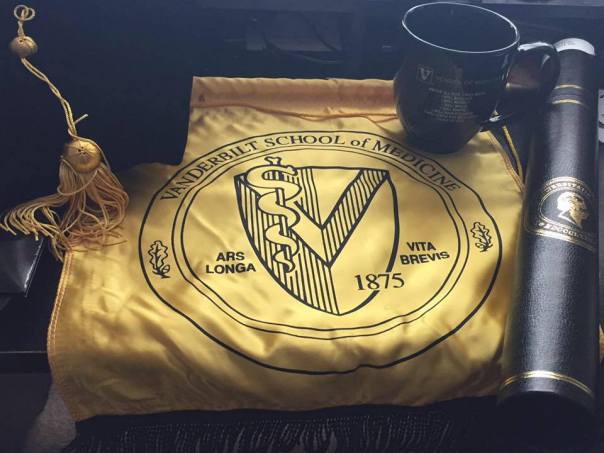Apologies again for such a delayed post. The months since my last update have been pretty full, as you might have guessed.
After finishing classes, I had grand plans for the month-and-some leading up to graduation. Among these, I wanted to finish a book I’d been slowly reading and perhaps start a new one, learn to play some songs (mine and others) on my guitar, and experiment with Garageband. Very little of this got done (it is now June and I am still waist-deep in Adam Bede), but I’m still pleased with what did happen in that time.
The month of April had several highlights. My mom visited a couple of times and helped me search for a new apartment; after several under- and overwhelming appointments, phone calls, and building tours, I finally found a place that fit most of my needs and wants. I volunteered for (and performed at, with the Radial Grooves a cappella group) VMS’ Second Look Weekend for what is likely the last time. I celebrated my 25th birthday with several friends–and finally convinced myself to try Hattie B’s hottest flavor of hot chicken, Shut the Cluck Up (never again!). A few friends from church and I saw Amanda Cook in concert, which was incredible from both a musical and a spiritual standpoint. And I once again got to sing with my church’s worship team at mile 8 of the St. Jude Rock & Roll Marathon.
The first two weeks in May were also pretty eventful. Radial Grooves performed a few songs for Parent Weekend, during which the families of third year medical students get a taste of life at VMS. I sang another one of my original songs at VMS’ Cultural Series–this time with guitar accompaniment; figuring out chords to go along with the melody of the song and having a jam session with a friend so he could learn the song were both completely new and exciting experiences for me. The days leading up to graduation on Friday, May 13, involved celebratory lunches and dinners, a beautiful commissioning service by the Medical Christian Fellowship, Class Day, time with friends, and last-minute logistics.
Graduation day itself was a wonderful celebration of all we’d accomplished individually and collectively. Vanderbilt has two sets of ceremonies: a huge one in the morning during which all students from their respective schools process onto Alumni Lawn and officially get their degrees conferred, and smaller ones for recipients of graduate degrees at respective locations around campus. I felt like there were so many pieces to the puzzle that was my graduation day, but it all went by surprisingly quickly. It was only a month ago, but I barely remember walking onstage in Langford Auditorium to receive my diploma and have the Dean of Students place the doctorate hood over my head. The strawberries and champagne (although I didn’t drink any) reception, long-overdue first trip to Monell’s, and further celebration with family that followed all sort of feel like they happened in a different lifetime. It’s funny how such significant moments become fairly distant memories in so little time.
I’ve gotten a few questions about what will happen now. I am officially a doctor (you might say that Eni, MD is more than just a blog title now), but I still need more training to be able to practice independently as a psychiatrist. That’s where my 4-year residency program (aka my very first job) comes in. July 1 is when I will officially start; in the meantime, I’ve been settling in to my new apartment, getting accustomed to driving in Nashville (yes, I have a car now!) and making other preparations, such as becoming certified in Pediatric Advanced Life Support (PALS) and gathering everything I need for orientation, which will start later this week. I’m really nervous about this next chapter, but I’m also excited to meet my co-interns, start seeing patients again, and see how everything will come together.
You might also be wondering about my plans for this blog. As fun as it’s been to keep everyone updated on my life for the past 4 years (it’s been this long! I can barely believe it myself!), I think this might be my last post. I’m thankful to everyone who’s read my blog, and I hope that they’ve been helpful, whether you’re a medical student trying to figure out how to study (or how NOT to study) for a shelf exam or someone who’s always wondered how one becomes a doctor (or something like that).
Here’s to the next chapter,
Eni, MD

